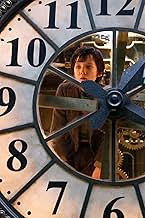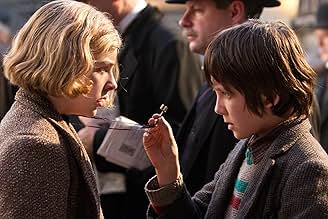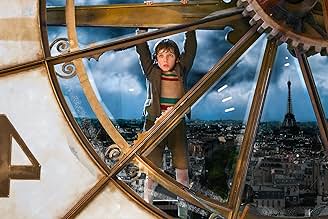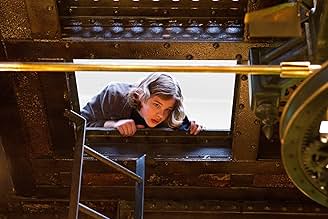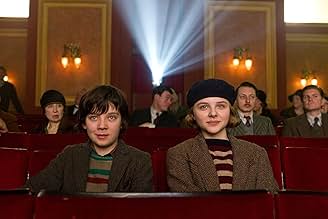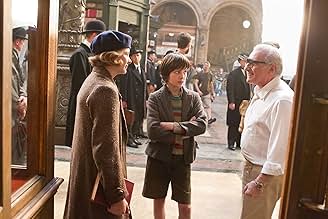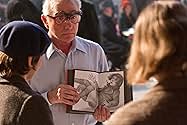In 1931 Paris, an orphan living in the walls of a train station gets wrapped up in a mystery involving his late father and an automaton.In 1931 Paris, an orphan living in the walls of a train station gets wrapped up in a mystery involving his late father and an automaton.In 1931 Paris, an orphan living in the walls of a train station gets wrapped up in a mystery involving his late father and an automaton.
- Director
- Writers
- Stars
- Won 5 Oscars
- 61 wins & 193 nominations total
- Director
- Writers
- All cast & crew
- Production, box office & more at IMDbPro
Featured reviews
Like many, I suspect, I went into this film ready to be dazzled by the cinematography and a rare, nice clean story by Director Martin Scorcese. I wasn't disappointed although I found the story lagging in a few brief spots. Cutting the film another 10 minutes might have solved that. Having said that, though, a month later I'm all ready to view it again!
To me, the most interesting and amazing scenes were not involving the two young main characters and the railroad station, but the ones in the last 30-or-so minutes which dealt with very early films and how they made them. It was incredibly colorful and an education to film buffs everywhere. Anyone who loves movies and appreciates the history of the art should love the last part of this story.
Meanwhile, the bulk of the story still offers many great sights and sounds and I have no quibbles with any of the actors. Youngsters Asa Butterfield ("Hugo") and Cholë Grace Moretz ("Isabelle") were both about 13 when they made this and seem to have good careers ahead of them. I didn't recognize Sacha Baron Cohen as the station inspector. He was great in that role. As for Ben Kingsley, when is he ever bland?
This is one of those "family films" that can be enjoyed just as much - and probably more - by adults. I wish Scorcese would make more of this kind of material.
To me, the most interesting and amazing scenes were not involving the two young main characters and the railroad station, but the ones in the last 30-or-so minutes which dealt with very early films and how they made them. It was incredibly colorful and an education to film buffs everywhere. Anyone who loves movies and appreciates the history of the art should love the last part of this story.
Meanwhile, the bulk of the story still offers many great sights and sounds and I have no quibbles with any of the actors. Youngsters Asa Butterfield ("Hugo") and Cholë Grace Moretz ("Isabelle") were both about 13 when they made this and seem to have good careers ahead of them. I didn't recognize Sacha Baron Cohen as the station inspector. He was great in that role. As for Ben Kingsley, when is he ever bland?
This is one of those "family films" that can be enjoyed just as much - and probably more - by adults. I wish Scorcese would make more of this kind of material.
What Martin Scorcese has managed to do is add story dimensionality to a family film that has 3D technology. Some of the dimensions he's included which don't always make into Hollywood blockbusters are an imaginative and original concept, thematic unity and resonance and deft homage to film itself, in the story of Georges Méliès, French film pioneer.
Saw the film in an advance screening and we were among the many there who were obviously not standard family film consumers. This being a Scorcese film is likely to bring lots of adults to Hugo and I would think many of them, like me, will feel the film stands up as entertainment for all age groups.
I especially enjoyed the resonance and intricacy of the theme of clocks, clockworks, animatronics and "the ghost in the machine"--our fear, in the post industrial age that perhaps we are just a rather complex machine, rather than a divine creation. This is all beautifully rendered cinematically. I doubt the little ones will be bewildered while older viewers can pick out levels and layers in the film.
Good fun and visually interesting throughout. The 3D is used in service of the story. I hope Hollywood is watching and notices that special effects are only special when they get the heart of the machine working, like Hugo's little man.
Saw the film in an advance screening and we were among the many there who were obviously not standard family film consumers. This being a Scorcese film is likely to bring lots of adults to Hugo and I would think many of them, like me, will feel the film stands up as entertainment for all age groups.
I especially enjoyed the resonance and intricacy of the theme of clocks, clockworks, animatronics and "the ghost in the machine"--our fear, in the post industrial age that perhaps we are just a rather complex machine, rather than a divine creation. This is all beautifully rendered cinematically. I doubt the little ones will be bewildered while older viewers can pick out levels and layers in the film.
Good fun and visually interesting throughout. The 3D is used in service of the story. I hope Hollywood is watching and notices that special effects are only special when they get the heart of the machine working, like Hugo's little man.
There must be something unifying in our globes collective consciousness, as 2011 saw two films that looked back at the cinematic past. Strangely, it took a French film maker, Michel Hazanavicius, to release a movie that pays homage to early, silent American cinema (The Artist). Conversely, Martin Scorsese, a well-known cinephile, delights with his love of early European silent cinema, in his often beautiful 'children's' film, Hugo.
Set in 1930's Paris, the main focus of this cinematic love is the work of the first movie magician, Georges Melies. We are introduced to Hugo (Asa Butterfield), a young man whose father left him a automaton after his death. It was a project that they worked on together, but never finished it. Hugo's main mission is to get the object working. As an orphan, Hugo hides in the rafters of a train station, maintaining the clocks that his drunken uncle used to do. After befriending a young girl, Isabelle (Chloe Moretz), he finally gets the automaton working, and it opens up a mystery that leads to the forgotten cinema of Melies (Ben Kingsley), now working on a store in the station.
The film shows love for silent cinema, and particularly the magic of Melies. Sacha Baron Cohen's station inspector is occasionally funny, and his character seems to be filtered through both Peter Sellers' Inspector Clouseau, and Jacques Tati's Monsieur Hulot, but he just doesn't seem to really progress at all, and feels almost like a filler character. Scorsese, like Robert Zemekis and Bob Gale before, reference that iconic Harold Lloyd moment in Safety Last! (1923), as Hugo hangs from a clock face.
Like so many others who speculate about the choices of Oscar nominations, Hugo, I feel, is not a contender for the best picture Oscar. There were some far better films produced in 2011. That said, the film is beautiful, accomplished , and often fun. Also, the resurgence of interest in a forgotten father of cinema, is completely touching, and leaves a warm feeling in the heart. Unfortunately, I did not see this in 3D; as far as I am aware, Scorsese uses it to brilliant degrees, so perhaps this would have made the experience perfect (despite the fact that I care not for the dimensions of 3.
www.the-wrath-of-blog.blogspot.com
Set in 1930's Paris, the main focus of this cinematic love is the work of the first movie magician, Georges Melies. We are introduced to Hugo (Asa Butterfield), a young man whose father left him a automaton after his death. It was a project that they worked on together, but never finished it. Hugo's main mission is to get the object working. As an orphan, Hugo hides in the rafters of a train station, maintaining the clocks that his drunken uncle used to do. After befriending a young girl, Isabelle (Chloe Moretz), he finally gets the automaton working, and it opens up a mystery that leads to the forgotten cinema of Melies (Ben Kingsley), now working on a store in the station.
The film shows love for silent cinema, and particularly the magic of Melies. Sacha Baron Cohen's station inspector is occasionally funny, and his character seems to be filtered through both Peter Sellers' Inspector Clouseau, and Jacques Tati's Monsieur Hulot, but he just doesn't seem to really progress at all, and feels almost like a filler character. Scorsese, like Robert Zemekis and Bob Gale before, reference that iconic Harold Lloyd moment in Safety Last! (1923), as Hugo hangs from a clock face.
Like so many others who speculate about the choices of Oscar nominations, Hugo, I feel, is not a contender for the best picture Oscar. There were some far better films produced in 2011. That said, the film is beautiful, accomplished , and often fun. Also, the resurgence of interest in a forgotten father of cinema, is completely touching, and leaves a warm feeling in the heart. Unfortunately, I did not see this in 3D; as far as I am aware, Scorsese uses it to brilliant degrees, so perhaps this would have made the experience perfect (despite the fact that I care not for the dimensions of 3.
www.the-wrath-of-blog.blogspot.com
It has taken me a long time to get round to watching Hugo, but I am so glad that I did. This is a wonderful and simply glorious ode to early cinema told through the eyes of Hugo (Asa Butterfield), an orphan who after the death of his clockmaker father (Jude Law) ends up living in the walls of a Parisian train station charged with winding the station's numerous clocks.
Hugo's only link back to his late father is through a majestic mechanical automaton, a sort of tin man which his father had been restoring in his spare time. As appears to be the way with all tin men this one is also missing a heart, but this time it is a heart shaped key which Hugo is convinced if he can find will unlock the secrets inside. This leads young Hugo on a dangerous but adventurous search which often lands him in the clutches of either the local shopkeeper (Ben Kingsley) or the Station Inspector (Sacha Baron Cohen). Help is at hand though from the shopkeeper's god daughter Isabelle (Chloe Grace Moretz) and as the two join forces they soon discover they have more in common than they thought.
In Hugo, Scorsese has produced a truly magical tale which sucks the viewer into the screen via the innovative use of 3D so immersing us within the dynamics of Parisian life and the wonders that take place within the walls of the station. Butterfield is perfectly cast as young Hugo, a curious young boy determined to survive in a hard and cold world which constantly seems to deal him a bad hand; you simply can't help but love him. Moretz after a slightly shaky start soon finds her feet (and her accent), Kingsley is excellent, especially as the story develops and there is strength in depth from a top notch supporting cast including Emily Mortimer, Ray Winstone and Christopher Lee to name but a few.
Hugo's strength however is in its story, which effortlessly unfolds in front of you with real grace and elegance. Scorsese's love for the history of his craft and his desire to share this tale of early cinema is evident in every frame. Whilst it may not be the most historically accurate portrayal of cinematic history it has a true and good heart which beautifully captures the essence of what is cinema.
Some people have criticised Scorsese for creating a children's movie that is inaccessible for most children. I strongly disagree on this point. To me Hugo is a classic children's movie which works across all age spectrums, much in a similar vain to Spielberg's ET. In a world of Woody, Buzz, Jessie and meatballs that fall from the sky (which don't get me wrong are all fabulous in their own right), it is refreshing to see a children's movie of old. It feels like a magical Christmas movie to me, perfectly accessible and enjoyed by all.
Hugo is fully deserving of the many accolades that it picked up during the awards season. It is a wonderful and engaging film which I will show my children when they are a little older and I am certain they will fall in love with cinema in the same way their father need did so many years ago.
Review by Will Malone www.maloneonmovies.com
Hugo's only link back to his late father is through a majestic mechanical automaton, a sort of tin man which his father had been restoring in his spare time. As appears to be the way with all tin men this one is also missing a heart, but this time it is a heart shaped key which Hugo is convinced if he can find will unlock the secrets inside. This leads young Hugo on a dangerous but adventurous search which often lands him in the clutches of either the local shopkeeper (Ben Kingsley) or the Station Inspector (Sacha Baron Cohen). Help is at hand though from the shopkeeper's god daughter Isabelle (Chloe Grace Moretz) and as the two join forces they soon discover they have more in common than they thought.
In Hugo, Scorsese has produced a truly magical tale which sucks the viewer into the screen via the innovative use of 3D so immersing us within the dynamics of Parisian life and the wonders that take place within the walls of the station. Butterfield is perfectly cast as young Hugo, a curious young boy determined to survive in a hard and cold world which constantly seems to deal him a bad hand; you simply can't help but love him. Moretz after a slightly shaky start soon finds her feet (and her accent), Kingsley is excellent, especially as the story develops and there is strength in depth from a top notch supporting cast including Emily Mortimer, Ray Winstone and Christopher Lee to name but a few.
Hugo's strength however is in its story, which effortlessly unfolds in front of you with real grace and elegance. Scorsese's love for the history of his craft and his desire to share this tale of early cinema is evident in every frame. Whilst it may not be the most historically accurate portrayal of cinematic history it has a true and good heart which beautifully captures the essence of what is cinema.
Some people have criticised Scorsese for creating a children's movie that is inaccessible for most children. I strongly disagree on this point. To me Hugo is a classic children's movie which works across all age spectrums, much in a similar vain to Spielberg's ET. In a world of Woody, Buzz, Jessie and meatballs that fall from the sky (which don't get me wrong are all fabulous in their own right), it is refreshing to see a children's movie of old. It feels like a magical Christmas movie to me, perfectly accessible and enjoyed by all.
Hugo is fully deserving of the many accolades that it picked up during the awards season. It is a wonderful and engaging film which I will show my children when they are a little older and I am certain they will fall in love with cinema in the same way their father need did so many years ago.
Review by Will Malone www.maloneonmovies.com
Saw it today in a sneak preview today at the Director's Guild in LA. James Cameron who was there professed it's a masterpiece and the best 3D to date. And he's right on both fronts. The film is exquisitely crafted. The cinematography and set design is likely going to take home a couple gold guys. It's a film lover's dream movie. As with many of Scorsese's films, it's an inspired film history lesson along side of being a dreamlike children's fable. A really unique combination that will work for the film enthusiasts and discerning family's with kids. Maybe a bit long for broad audiences with very little kids, but the images are so enchanting, it should win over most everybody. Sasha Baron Cohen is a brilliant and hilarious standout as the twitchy constable. It should be very well received just on the 3D alone.
What Scorsese Film Ranks Highest on IMDb?
What Scorsese Film Ranks Highest on IMDb?
Cinema legend Martin Scorsese has directed some of the most acclaimed films of all time. See how IMDb users rank all of his feature films as director.
Did you know
- TriviaThe guitarist, who appeared early in the movie and at the Georges Méliès party near the end, was modeled after famed Belgian guitarist Django Reinhardt. The filmmakers even went so far as to have the actor's left-hand match Django's. He doesn't use his fourth and fifth fingers (which were burned in a fire).
- GoofsThe movie is set in 1931. From 1925 to 1934 the Eiffel Tower had illuminated signs for Citroën that adorned three of the tower's four sides. However, in the movie the lights on the tower are as they are today, with no Citroën sign on it.
- Quotes
Hugo Cabret: Maybe that's why a broken machine always makes me a little sad, because it isn't able to do what it was meant to do... Maybe it's the same with people. If you lose your purpose... it's like you're broken.
- Crazy creditsThere is only one opening credit, the film's title, which does not appear until nearly 15 minutes into the film.
- Alternate versionsThe UK, French, Italian, Swiss, Turkish and Middle Eastern versions have the Paramount Pictures logos and references to Paramount Pictures removed because the film was not distributed by Paramount in those territories.
- ConnectionsFeatured in Maltin on Movies: The Muppets (2011)
Details
- Release date
- Countries of origin
- Official sites
- Language
- Also known as
- La invención de Hugo Cabret
- Filming locations
- Production companies
- See more company credits at IMDbPro
Box office
- Budget
- $150,000,000 (estimated)
- Gross US & Canada
- $73,864,507
- Opening weekend US & Canada
- $11,364,505
- Nov 27, 2011
- Gross worldwide
- $185,770,310
- Runtime
- 2h 6m(126 min)
- Color
- Sound mix
- Aspect ratio
- 1.85 : 1
Contribute to this page
Suggest an edit or add missing content







